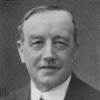Arthur Henderson

Arthur Henderson
Arthur Henderson PCwas a British iron moulder and Labour politician. He was the first Labour cabinet minister, won the Nobel Peace Prize in 1934 and, uniquely, served three separate terms as Leader of the Labour Party in three different decades. He was popular among his colleagues, who called him "Uncle Arthur" in acknowledgement of his integrity, his devotion to the cause and his imperturbability. He was a transitional figure whose policies were, at first, close to those of the Liberal...
NationalityBritish
ProfessionPolitician
Date of Birth13 September 1863
The market expects someone else to come in with a better bid.
Originally the League was forbidden to touch the subject of tariffs, and there was a strong predisposition to regard banking as a mystery that must be removed entirely from the purview of governments.
It has been said that since September, 1931, the world has been divided into wholehearted violators and halfhearted supporters of the Covenant.
Men and women everywhere are once more asking the old question - is it peace?
But the standards of statecraft insisted upon the untrammeled claim of each nation to uphold its own view of its rights by force and to build whatever armaments it considered necessary for this purpose.
We cannot give up hope for the future of humanity because it is our destiny to shape that future for good or ill.
On the contrary, the characteristic element of the present situation is that economic questions have finally and irrevocably invaded the domain of public life and politics.
Thus, there can be no real disarmament except on the basis of the collective peace system of the League of Nations.
Another essential to a universal and durable peace is social justice.
This is our world, and we must make the best of it.
To solve the problem of organizing world peace we must establish world law and order.
The forces that are driving mankind toward unity and peace are deep-seated and powerful. They are material and natural, as well as moral and intellectual.
Perhaps the grimmest aspect of this great paradox is that the very nations that are chiefly responsible for starting and for maintaining the Disarmament Conference are also the nations that have begun a new arms race.
Whatever we do or fail to do will influence the course of history.